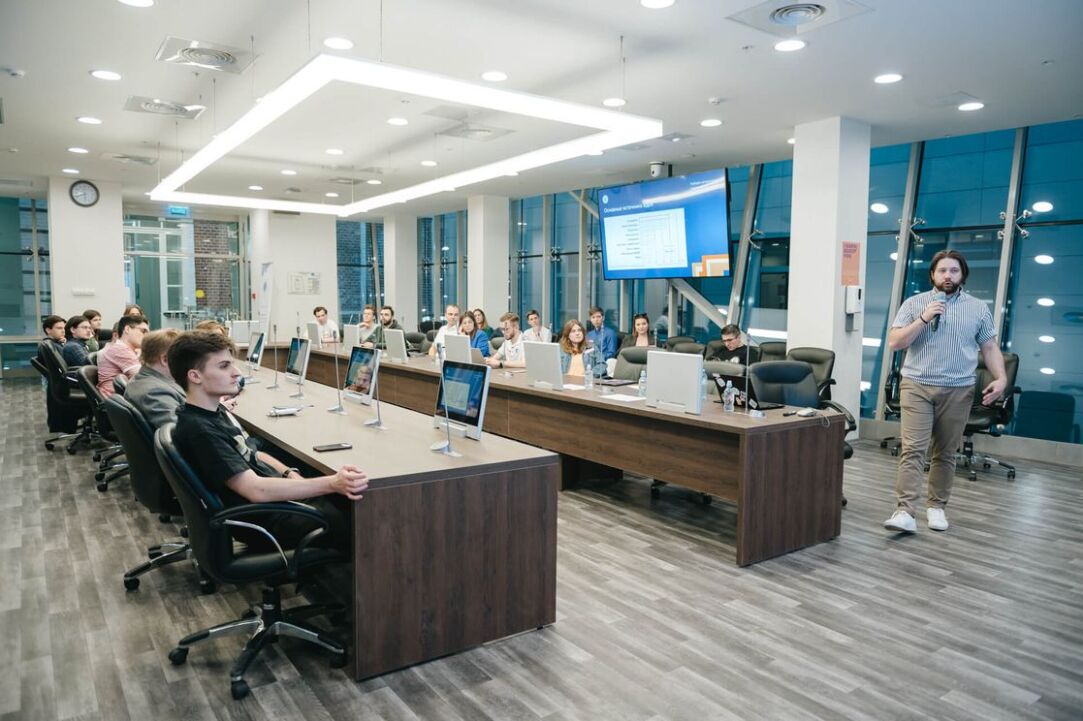‘I Did Not Miss a Single Class’: Students Tell Future Applicants How HSE University Trains Innovators

HSE University’s Department of Innovation Management held an Open Day for the Master’s programme in Corporate Research, Development and Innovation Management, another enrolment for which will take place this year. Unlike traditional open days, where teachers and supervisors give information about programmes, this time the applicants talked to first- and second-year students.
Other highlights included an interactive quiz, networking opportunities, and a buffet with ‘innovative’ foods.
Corporate Research, Development and Innovation Management is a full-time Master’s programme in innovation. It trains ‘innovative special forces’—development leaders, change managers, creators of new products, new businesses, and new markets. All classes are held in the evening so that training can be combined with work. There are state-funded and fee-paying places, and admission is based on the results of a portfolio competition.
According to the hosts of the Open Day, the programme’s advantages include interdisciplinarity, project work, partial instruction in English, and immersion in a professional environment. The programme fosters a unique community of entrepreneurs and investors who explore an exciting symbiosis of academic and practice-oriented disciplines.
Another feature is the ‘three in one’ educational approach. Applicants enter the programme, begin to study, and eventually specialise in one of three trajectories: Corporate Innovation (where they learn how to build innovative processes and take leadership positions in a company), Research and Development (how to turn research results into in-demand technologies and developments), or Startup (how to develop and bring your own business to the market from scratch).
Each trajectory was presented by students of the programme who have achieved success in their chosen field.
The Corporate Innovation trajectory was presented by Sergey Topychkanov, Product Manager of the Innovation Directorate of the Etalon construction holding. He is 32 years old, has 10 years of experience in IT, and holds an HSE University’s master’s degree as his fourth education. Explaining why he entered the programme, he said ‘It seems that I know everything and I can quickly look up the things that I don’t know. But I understand that I lack theoretical expertise.’
Sergey said that the established community of like-minded people was an important feature of the programme. While most of the students in his group are recent graduates, all of them already work in various fields. He also highly appreciated the mentor of his chosen trajectory, Dmitry Ognev, Managing Partner, Business Development Director of JSC TEKORA, who ‘always has answers to tricky questions.’
Yulia Oganova, field head of the ‘Platform of University Technological Entrepreneurship’ National Technological Initiative project, spoke about the Research and Development (R&D) trajectory. She has experience working with start-ups since 2018 and until recently headed an accelerator in the road transport industry.
Yulia has already studied at the Department of Innovation Management. She took Andrey Tsymbal’s advanced training course ‘Commercialisation of High Technology’, after which she received an early invitation to enter the Master’s programme. She has managed to build quite a strong portfolio as part of her work, writing articles for magazines, giving talks, and actively promoting the concept of open innovation.
According to Yulia, HSE University’s Master’s programme differs from the traditional programme she previously took in that there is a lot of team work and project activity. Guests with experience implementing innovations in large companies are invited to the Mentors’ Seminar, and you can always ask them how they organise the processes within their work.
And finally, the Startup trajectory was presented by Albert Tazhigulov, co-founder of Myolimb LLC, which develops and produces components for prostheses. He described his company as ‘engineers coming together to do business, but it is not being done.’ Smart, tech-savvy people capable of building prostheses can calculate the cost of a scientific innovation, but may not understand how to bring it to market.
Albert found out about the Master’s programme by chance. He saw the teaching staff and ‘realised that these are not some traditional teachers who remained at the department to work.’ He looked online in order to better understand the curriculum. He added that he ‘got a thrill from the very first day of training,’ and although he did not aim to attend all the classes, in the end he did not miss a single one.
Thanks to his studies, Albert was able to prepare high-quality presentations on the company (with help from his teachers) and present a well-developed business and financial model. He honed his negotiation skills and worked in a team with real experts in their field, who helped him look at the project from a different angle.
‘The department is really innovative—everything is moving forward here. I recommend it to those who want to curb the chaos inherent in startups and better understand the product that you develop yourself,’ he concluded.
After the students answered questions from future applicants, an innovation quiz was held for all the event participants—an intellectual and entertaining battle dedicated to innovations, technologies, and start-ups. The participants were divided into teams of three and asked to answer questions on innovation topics during four rounds. It was forbidden to use the internet and answers had to be written down on a form.
In the first round, the participants had to recall, for example, the name given to startups with a market value of more than $1 billion (choosing from ‘zebra’, ‘narwhal’, ‘unicorn’, and ‘ten-horn’). The third round included a question on the unusual name of a community in Chelyabinsk Region—it appeared after the War of 1812, which was commemorated by the construction of an unusual cellular communication tower in this settlement. It turned out that the village is called Paris, and the tower resembles the Eiffel Tower.
The event also included a buffet where the participants could taste some innovative plant-based products, including meat alternatives. The company producing these foods has established partner relations with the Department of Innovation Management to present their developments and find like-minded people.

